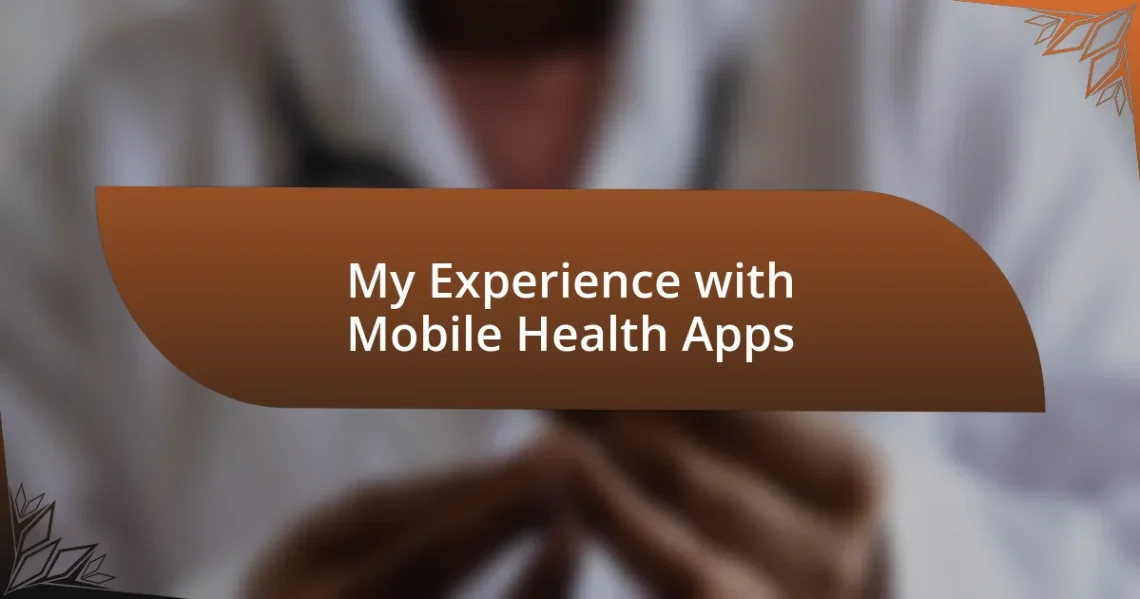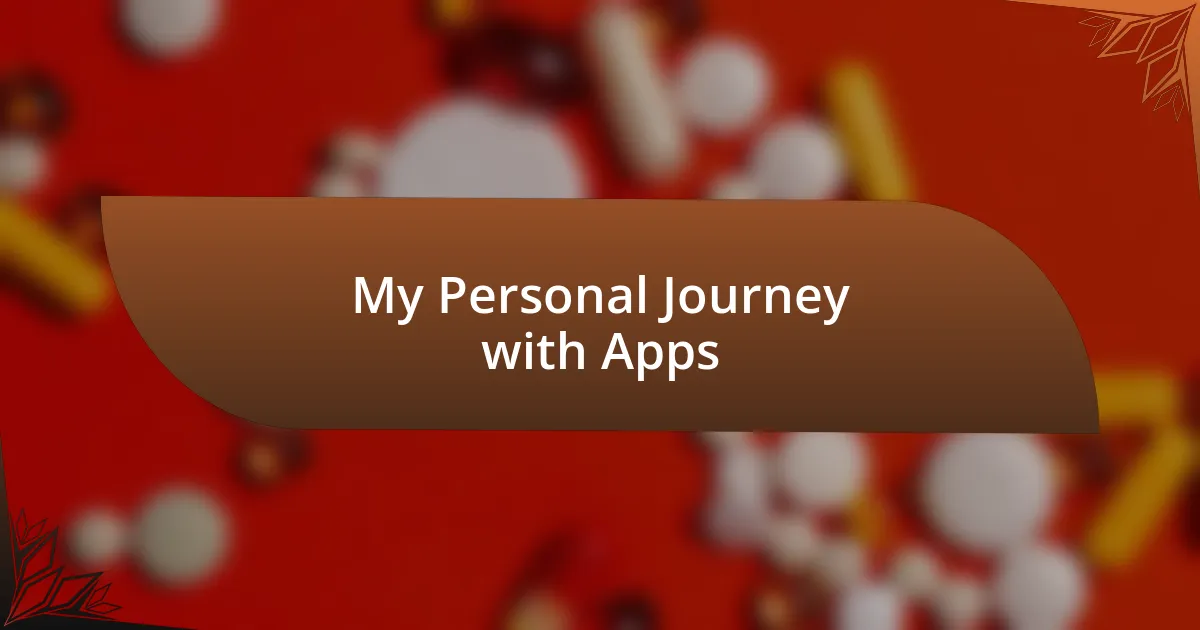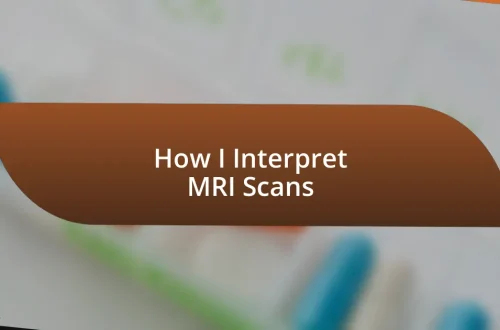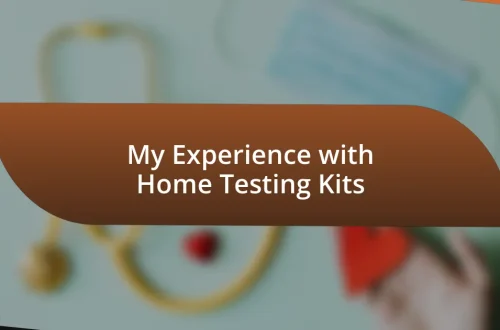
My Experience with Mobile Health Apps
Key takeaways:
- Mobile health apps enhance personal well-being through accessibility, motivation, and accountability in managing health goals.
- Key features for successful apps include user-friendly interfaces, personalization options, data privacy, and integration with wearable devices.
- Quality of apps focused on specific health aspects is prioritized over having numerous features, leading to more meaningful use.
- Challenges include data overload, app reliability issues, and privacy concerns affecting user trust and engagement.

Introduction to Mobile Health Apps
Mobile health apps have emerged as powerful tools that align technology with personal well-being. From tracking daily activities to monitoring chronic conditions, these apps offer an unprecedented level of accessibility to health resources. I remember downloading my first health app and being excited to see how it could help manage my fitness goals—it became a game changer.
Reflecting on my experiences, I’ve found that these apps can provide both motivation and accountability. For instance, I often ask myself, “How did I keep track of my progress before?” The ability to visualize my achievements through graphs and reminders kept me engaged in a way I never anticipated. This digital support system fosters a sense of connection to my health journey that I didn’t realize was possible.
Moreover, the rise of mobile health apps reflects a broader trend towards patient empowerment. Have you ever felt overwhelmed by a health decision? I certainly have. Having the right app can demystify complex medical information, putting crucial knowledge at my fingertips. This accessibility bridges the gap between professional advice and personal action, making a world of difference in how we approach our health.

Key Features to Look For
When choosing a mobile health app, I’ve learned that certain features can significantly enhance the user experience. For instance, I appreciate an intuitive design that allows me to navigate effortlessly. An app that’s clunky or confusing can quickly lead to frustration. Additionally, I’ve found that personalized goals and recommendations keep me engaged and motivated to stick with my health journey.
Here are key features I always look for in mobile health apps:
- User-friendly interface
- Personalization options for goals and tracking
- Integration with wearable devices
- Strong data privacy and security protocols
- Access to a community or support network
- Ability to sync with healthcare providers
- Comprehensive tracking for various health metrics
I remember trying out an app that didn’t let me customize my goals, and it felt like I was using a one-size-fits-all solution—definitely not motivating. Meanwhile, when I found one that allowed me to set specific targets aligned with my lifestyle, it transformed the way I approached my fitness. Features like these not only enhance usability but also promote a sense of ownership over my health, creating a more relatable and fulfilling experience.

My Personal Journey with Apps
When I first ventured into the world of mobile health apps, I was overwhelmed by the options available. I remember downloading one app that claimed to track everything from my steps to sleep patterns. Initially, it felt exhilarating, but soon the sheer volume of data became daunting. It taught me the importance of finding the right balance between comprehensiveness and usability—something I didn’t consider back then.
Over time, I discovered the value of apps that focused on specific aspects of health, like mindfulness or nutrition, rather than trying to do it all. There was one particular app that guided me through daily meditation sessions. Each time I completed a session, I felt a weight lift off my shoulders, illuminating how a simple focus could create a profound impact on my stress levels.
Reflecting on my experiences has reinforced the idea that quality trumps quantity in mobile health apps. While I once believed that having all the features under one roof was ideal, I now cherish the simplicity and effectiveness of apps tailored to my individual needs. The journey made me realize that it’s about how these tools fit into my lifestyle and enhance my well-being, rather than just the data they provide.
| App Experience | Emotional Insight |
|---|---|
| Overwhelmed with data | Initial excitement turned to frustration |
| Focused on specific health aspects | Relief and mental clarity from mindfulness |
| Quality over quantity | Empowerment through tailored experiences |

Challenges Faced While Using Apps
While navigating mobile health apps, one significant challenge I faced was data overload. I vividly recall the frustration of having too many notifications and metrics to track, which often left me confused rather than motivated. How could I possibly focus on my goals when the app was bombarding me with alerts about everything from hydration levels to daily step counts? It was overwhelming, to say the least.
Another hurdle came with inconsistency in app performance. I remember one app that would frequently crash, leading me to question its reliability. It was disheartening to stick to a regimen only to have the tool designed to support me fail in the crucial moments. This experience made me wonder: how can I trust my health to technology that isn’t dependable?
Privacy and security issues also loomed large during my experience. I often found myself contemplating what personal data I was sharing and how it would be used. A particular moment that stuck with me was when I ignored the fine print in the app’s terms and conditions, which left me uneasy about how my information might be shared with third parties. That realization made me cautious about which apps I chose to invite into my health journey.




